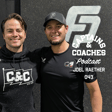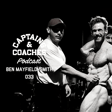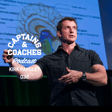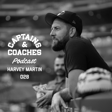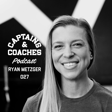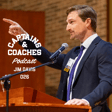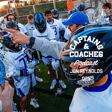Athletic Pressure and Enjoyment
00:00:00
Speaker
And it's not that I didn't perform well, but the process of getting up to that point was so pressure driven that I couldn't even enjoy it. So what I've accomplished as an athlete is something that less than 100 people on alive on the planet can say they've done right now. And the entire process, I literally sat there like wringing my hands internally going, oh my God, am I going to be okay? I just want to look like I belong up there. Do I belong up there? Is this going to be okay? Am I doing good enough? Am I working hard enough? Meanwhile, I was working hard enough to have seizures twice a week.
00:00:26
Speaker
Um, was some of the things that were going on. And so it's, it's really easy as an athlete. Again, if you've always been told and praise for hard work, you're like, well, why better just keep doing more of
Introduction to Captains and Coaches Podcast
00:00:35
Speaker
that? Welcome to the captains and coaches podcast, where we explore the art and the science of leadership through the lens of athletics and beyond. I'm your host Texan Quilkin. And today we're deep dive into the world of self leadership and athletic excellence with someone who embodies the perfect blend of clinical expertise. and competitive spirit. I'm thrilled to welcome Dr. Danny LaMartina, a physical therapist who has not only competed at elite levels in both bodybuilding and powerlifting, but has become one of the most trusted names in rehabilitation for strength athletes nationwide. As an IFBB pro and elite FTS columnist,
00:01:11
Speaker
Dr. Danny brings a unique perspective that bridges the gap between clinical practice and real-world performance. Dr. Danny and I have been part of the same coach mastermind for a couple years and always had very enlightening conversations when we
Dr. Danny LaMartina's Unique Perspective
00:01:26
Speaker
get together. And today,
00:01:27
Speaker
We just decided to hit record. We explore how self-leadership principles have shaped her journey from athlete to renowned coach and clinician. Whether you're an experienced lifter, someone recovering from injury, or just passionate about passion, this conversation will challenge you to think differently about your potential. Please welcome Dr. Danny, ready, ready, and break.
00:01:56
Speaker
Well, we are the Fun Club. We're going to roll right into it. Welcome to the Captains and Coaches Podcast. Dr. Danny, thank you for joining me. Thank you for having me. On Location. On Location. We are in a secret location in Virginia.
00:02:11
Speaker
Very secret. And we're attending our coach masterminds where we've been getting our businesses together all day, which has been fun. We're learning about content creation and what an opportunity to rejoin because we've attended this multiple times together and now it's an opportunity for me to share your experience and stories with the world.
Storytelling and Personal Reflection
00:02:34
Speaker
You know, I think one of the things that I really took away today while we were thinking about content creation was the way the process was framed with regards to storytelling. And I think we as coaches and as athletes very often forget the stories that we've really lived and the things that come with it. Hindsight is always 20-20, and it's much easier to take a lesson away kind of looking retrospectively. When you're in it, sometimes you can kind of forget, you know, that there's a lot of depth into the current situation that many of us are living through.
00:03:01
Speaker
Yeah, we can share one exercise we did. We looked through every year that we had in our phone. I was Google Photos. You have an iPhone? I do. So you're probably more in-depth than I, but we had to go back and pick three photos from every single year. So mine went up to 2012, so I had a lot of years to roll through.
Bodybuilding Journey and Support
00:03:20
Speaker
We don't have to go through every single one, but what were one or two or your favorite photos that you pulled out that just brought back joy and there was a story that you wanted to share?
00:03:30
Speaker
you know It's interesting. So I am in the bodybuilding world. I've done very, very well. I turned pro, got my pro card very, very quickly. I then won a pro show very quickly and made it to the Olympia very quickly. And when I look back at all those achievements,
00:03:46
Speaker
The photos around those achievements actually really didn't carry a lot of weight. The ones that I picked out the most were very often the the pieces that were kind of in between those landmarks. And the people that were with me in those times are the thing that for me have really stuck with that. So for example, I have another coach that I work with pretty closely. His name is Chris.
00:04:05
Speaker
He was, he's looked very closely with John Meadows, who in the bodybuilding world is, we miss him so much. Chris is now the lead mountain dog coach, but while I was prepping for Chicago Pro, which I won and was a huge deal,
Self-Leadership in Sports
00:04:19
Speaker
A lot of my favorite photos were actually screenshots of texts or messages that Chris had sent me along the way. This is like before I'd gotten on stage or before anything else. And Chris is someone who comes from a team sport background, very, very heavy. He still coaches quite a bit of football. And so he kind of takes that same coach mentality and brings it into bodybuilding. And it really reminded me of how much I grew up playing team sports and in ah in an individual sport.
00:04:45
Speaker
back or current situation, you kind of forget that part of yourself in a way. And that was, it was just really kind of eye opening for me to think back about who are all the other coaches I've had? How have they developed me as an athlete? um What does that mean for me as an athlete now? And then I also coach right now as well. So there's there's a little bit of kind of that role duality
Freedom vs Pressure in Self-Leadership
00:05:03
Speaker
that exists. That's pretty unique.
00:05:05
Speaker
One thing I wanted to cover with you was self-leadership. So even with a team, what drives me as a team athlete and a team coach right now was mutual accountability. So if I wasn't feeling it, I got to lean into my brethren. I'm going to work harder because I don't want to let them down. But I would treat them better than I would treat myself. now as an individual athlete,
00:05:32
Speaker
How is that balance within your mind you still are responsible to yourself and you got to work hard? It's interesting in that bodybuilding as much as it is an individual sport. Coming from the team sport background growing up I was team captain almost always and so there is always a sense of hyper responsibility on me to create.
00:05:54
Speaker
an environment that facilitated everyone else thriving and succeeding. And even in bodybuilding, I feel like that was a trait that was developed that just kind of stuck with me for you know a couple of decades now. Coming into bodybuilding, I feel like I had lost to that best part of myself. like That was one of the parts that I loved most about myself. and Transitioning to an individual sport, where I really started to thrive was when I did have that team environment. so Having someone like Chris you know texting you, he didn't have to. He wasn't you know handling my nutrition, which is the big part of the actual competition prep itself.
00:06:30
Speaker
But those moments, knowing that what I did and the work that I did and how I showed up as a reflection of my coach as well, for me, that was something that merely made me want to dig deeper. But not every coach does that. So the coach that was handling my nutrition and plenty of other coaches and in my sport actually prefer to kind of say, know like, yes, this is a reflection of me, but not really, this is more for you.
00:06:53
Speaker
because it is so execution oriented day in and day out. And I think you can probably resonate with this too. What's interesting about that is in in the sport of bodybuilding that's individual, the execution day in, day out, a coach would feel distance from.
00:07:08
Speaker
In the other sport world where we have a team, the best coaches I've had cared about what happened on the day in and day out. So I just think that's really interesting to kind of appreciate how much that dynamic shifts um and each athlete and each coach is gonna have a better style.
Internal and External Pressure
00:07:24
Speaker
With regards to self leadership, that was something that I've really had to lean heavily into because there's a difference between self leadership for freedom and self leadership that is pressure oriented. Explain.
00:07:41
Speaker
Boom. It's like, how do you take an athlete's heart and unpack it? Because that's really what that is, right? Self leadership with freedom versus pressure.
00:07:56
Speaker
I'm gonna pass that to you because I need to form some thoughts about that for now. My fast thinking from a self leadership perspective, the pressure, I would either make it up. So thinking, oh, the pressure is coming from family dynamics. The pressure is coming from the competition. I'm imagining what they're doing. So if I take a day off,
00:08:21
Speaker
they're one step ahead of me. So I feel that it would be just this, it's self-created, it's internal pressure. And we see it in professional athletes in, I mean, basketball is an example of a free throw line during the clutch time. If you've shot that free throw tens of thousands of times, nothing changes about your movement pattern. It's a closed loop.
00:08:46
Speaker
And then if you start to think or listen to the fans wave the the balloons around or whatever. Now, okay, I just created the pressure within myself so that I could potentially miss that. Pressure to me, I think, is just internal, but it's external. We come up with external excuses for whatever our result
Mindset and Team Accountability
00:09:08
Speaker
is. You could use that, okay, I feel this stress, so I'm going to focus and dial in. Now we start to get on the other side of that coin.
00:09:18
Speaker
I think it's maybe the same side or different sides of the same coin. Absolutely. Now that I'm thinking about it and kind of hearing you talk about it too, whether it's a team or individual sport, I think as athletes, as coaches, um, you know, whatever context, what, what's that dividing line between a kind of good pressure of, I don't want to let these other people down and, um, you know, negative pressure.
00:09:44
Speaker
I think is a self-trust. And when there's a challenge and you trust yourself to overcome that challenge in a way that puts others in a good position or that works towards a common goal you know in a team sport, that's different than coming in a situation going, holy cow, I don't know if I trust myself to take this last penalty case to win the game. And I think a lot of times that self-trust is something that is internally driven. And you know what you mentioned a minute ago about the external stresses that we put on ourselves. yeah These are things that like I've very rarely had a coach put a negative pressure on me. It's usually been like, Hey, I believe in you. You can do this. That's why I'm putting you in this position. Oh, we've had a lot of different coaches. Apparently we have. Yeah. I think that self trust is the kind of thing that especially in youth athletes is really, really important. When I think about my athletic development, I had some coaches that were like, Hey, I believe in you, but they did it in a way that was very, Mmm.
00:10:43
Speaker
I don't want to say terse, but it was hard to hear at that age. And what that did was basically put me in a position as an athlete to say, if I fail, the team loses, it's my fault. And I think that's where, again, in my sport, we tend to collect people who have played team sports before, and or maybe they haven't. But the people who really thrive are the ones who have the positive self-talk versus those of us who
Balancing Performance and Leadership
00:11:08
Speaker
don't. And I'm one where I really struggle with my negative self-talk.
00:11:13
Speaker
And I think back about when that started. And I guess that's where I'm kind of coming back and thinking about Chris, sort of the coach that I work with, is because his self-talk with his athletes is so intentionally positive and so intentionally about like, hey, let's find a solution, let's get this together, let's make it happen kind of thing. And that's hard for me as an adult. So, you know, at 36, 35, 36, I had to go and figure out how do I learn to talk nicely to myself in the context of an individual sport when a coach is trying to help me do that. Really, really interesting.
00:11:44
Speaker
from my perspective as a leader and team captain, I was able to take pressure off myself by then leaning into others and elevating them and being that positive voice for them. that was how I quieted the negative voice. But now, me learning as a coach, now, just like Coach Chris has done well,
00:12:04
Speaker
you have to model and sometimes you start to create the conscious and the positive voice for your athletes. Absolutely. So then they're learning how to talk to themselves through how you're talking to them.
00:12:16
Speaker
I think that was undoing a lot of the negative experiences that I had throughout my athletic career, getting up to certain points. So I value Chris's opinion. He's also able to read the room. I imagine he coaches his other athletes with a little bit different tone of voice, potentially, is what they need. And that's a sign of a great coach. Yeah.
00:12:38
Speaker
I think one interesting thing that you that you said that kind of just got me thinking too is that when you were able to elevate others is when you were able to kind of feel most okay. And I think at times as as coaches, it's really important for us to be able to know when to shift the value system from performance to leadership.
Coaching Strategies for Mindset
00:12:54
Speaker
When I feel valued for the way that I can elevate others on the team, boy, that's a breath of fresh air. Man, I'm good at that. You're great at that. That's easy.
00:13:05
Speaker
When the value system is derived on, you must perform at a certain level or else. There's a fear associated with that. And I think you and I and many other coaches can probably make that next connection. And then as soon as our nervous system shifts into that sympathetic, well, that's how we break that feedback loop of skill that we've honed and developed and kind of interrupts that. So I think that's where I don't want to you know get too super cheesy and say that power positive thinking is going to change our motor control.
00:13:30
Speaker
But it absolutely does. When our brain is in a different state and our nervous system is in a different state, it absolutely changes our performance of how will we show up and execute. Yeah, and even as a coach, that was a learning experience for me, because in sport, so I still coach sport and strength, so in the games when we are down within it, I'm still trying to say positive, but I learned that wasn't enough. I needed to think more proactive, so then leaned into, there's a phrase within sports called alignment assignment technique.
00:14:02
Speaker
now these are the directions that I'm coaching. So I'm keeping energy high and teaching our sidelines to stay positive. But if the focus is on the field, I'm making sure guys are aligned in the right position. So that way it minimizes the mistakes they're going to make. if the wrong position, there's a lot of things that's going to go wrong. Then their assignment, who's the man that they're covering? What's their role on offense?
00:14:27
Speaker
where they got to go, and then their technique, how they play defense, how they shoot the ball. now, just by directing it that way, but always framing positive energy instead of just saying, hey, we're going to be all right. Now I'm coaching in the AAT, alignment assignment technique, and then teaching them how I want them to respond with their energy.
Self-Leadership Training Program
00:14:50
Speaker
a big thing that I lean into when we give up a goal, now I'm directing in them and saying, like, instead of you know, getting angry, I tell them good teams answer. Now I'm putting on them, are you a good team? I believe you are. What do you believe? So now putting them in a position to take on that mindset versus a lot of the body language, absolutely which is very easy to get negative, especially as a teenager, you can't control your body language. So that's the aim.
00:15:24
Speaker
Time out. What if I told you the path to transformation isn't about rigid schedules and crushing yourself daily in the gym. It's about moving with purpose and intention. At captains and coaches, we understand that true leadership starts with embodiment. When you look the part, you lead the part.
00:15:41
Speaker
but here's what makes our training programs different. The old bowl training program adapts to your life, not the other way around. Choose your own adventure, daily workouts less than 60 minutes a day with rep schemes that flex depending on your energy and feel.
00:15:55
Speaker
because we know sustainable growth happens when you become a self leader and stop missing workouts. This creates a powerful ripple effect to change how you move. You transform your mental, emotional state, transform your emotions and you elevate your decisions, better decisions. That's when your entire quality of life shifts. Join the old bull movement. Let's build more than a stronger body. Let's create a purposeful, powerful life on your terms. Click the link in the show notes for a seven day free trial to old bull program.
Building Confidence in Athletes
00:16:26
Speaker
today. And now, back to the show. Ready, ready, and ready. There are two things that I've kind of been caught on this week, and like hearing you talk is reiterating, which which is really cool. I love when I can take something, I'm kind of pondering it, I'm pondering, and hear it in a totally different context.
00:16:41
Speaker
and There are two kind of big phrases. One is that you create what you project. And I think one thing that you, it sounds like, do really well as a coach is acknowledging that both you know on the field and on the sideline, those are two kind of sort of sub-environments within the same ecosystem. But you need to be able to project whatever it is those guys need. And to be able to kind of flip that coin while still maintaining some cohesion and cohes consistency in your character is really big. And then the other thing was that action begets confidence. So what you said about good teams answer, I was like, yeah, like just hearing that phrase, if you're an athlete, like listening to this, like, you're going to get fired up hearing that phrase, but yeah, let's go. There was no time to, to put your head down. I mean, there's, there's always another opportunity, whether it's within the same game window or the next game or the next season. So framing it like that versus the,
00:17:37
Speaker
a scarcity mindset, to use a common term where the kids get trapped in quicksand and then the harder they fight against themselves, the deeper they go.
Identity and Performance Challenges
00:17:48
Speaker
And that's from the movie, The Replacements. I don't know if you've seen that. Oh, I need to. Oh, it's really bad. I've seen Kung Fu Panda. You're not in a movie. I'll hold my movie references. But it's Keanu Reeves and Gene Hackman. It's a really good, bad movie.
00:18:06
Speaker
I think I have seen parts of this. yeah And I do remember really enjoying it. I mean, it's a sports movie. Yeah, exactly. We know who wins. It's great. then leaning in, is it common for team athletes to enter into the bodybuilding space? Definitely, I think. I mean, the bodybuilding space either has people who were in the weight room because they didn't play team sports and they just wanted to do something or we played a team sport and needed something to do next. I want to come back to what you mentioned about that that athlete who gets kind of stuck in their own quicksand because that was that was me in 2022, my first year in the pro circuit. And I think about
00:18:55
Speaker
how much like how many different feelings, thoughts, and emotions. When it comes to my athletic side about like really being an athlete, like ah that's probably the place I'm most emotional in my life. It's hugely goal-oriented for me. It's a big part of my identity. To me, it's a display of how much dedication and discipline and work can really go into things. But I came off of that season feeling like I'd been one-upped the entire season.
00:19:18
Speaker
And there's there are very few things, I think, that make our athletes feel and play small than feeling one-upped. And you've probably seen it in locker room you know in the locker room, too, at times.
Adaptable Coaching Techniques
00:19:29
Speaker
There's a great player who, you know, has a lot of capabilities, a great, you know, asset to the team, but he kind of, in terms of that, like, it factor and the charisma, just kind of ends up...
00:19:38
Speaker
Almost getting lost And those are the people that I think we as coaches like it's our responsibility to kind of pull them aside and develop their gifts Develop the personality and and allow them to be that without having to be like they don't need to be I had this this was one of the most interesting Social experiments for me as a coach because I are our best player on one of the teams that I coached He was a coach's son So he knew every lever to pull. So whenever one of our coaching staff members stepped in to guide him or I even leading him, he knew exactly how to respond to us. He had X amount of years communicating with his dad on, you know, every stressful situation they had in the household growing up. So then it
00:20:27
Speaker
It took me maybe a year and a half to key in on, because he would just say the right thing, but not necessarily take that cue or take that action and apply it. it took me some time, but he knew exactly how to get us to go away or to make us satisfied in that.
00:20:46
Speaker
crucial conversation. yeah And then I realized like, okay, I have to take a completely different approach to this individual. even in that sense, it's not only the communications, not only the body language, now we get into the results, the action. And I don't know if he was lying to himself or he was just Like, this was a pattern in place, and then he was in a defiant position and role and just couldn't help himself. I don't know. There's layers to this, but then just me even picking up on the actions after the words just were never matching. I didn't want to blame him, so just found a different way to make the connection with the result, the goal that he wanted in mind, and we were able to make some big strides towards
Athlete's Self-Worth Beyond Performance
00:21:34
Speaker
the end of his career. How did you do that, if you don't mind me asking?
00:21:37
Speaker
I worked with another amazing coach with very high emotional quotient. So then we would take him at different times. So if I'm showing up early, now I'm leading by example to then have him show up early.
00:21:52
Speaker
and then now step into a responsibility of a leadership role. So now I'm gonna help him become a great leader, a great coach by him coaching up the JV. So now I'm listening to how he communicates down to the freshmen on the team for that way, okay, now I can shape you and your communication to a leader. And then my co-coach with high EQ, he would talk about the off the field stuff.
00:22:21
Speaker
we were able to coordinate and communicate, OK, here's a leadership goal and objective. Here's the offseason challenges, goals that he wants that are not related to lacrosse.
00:22:33
Speaker
Okay, let's bridge that gap. So we were able to take it from different angles and then put him in a position to succeed. And he went on to a higher level, so it it all worked out. I think that's a sign of a great coach. And I think i think that's what great coaching really is. I think a lot of people get so hung up on the X's and those and the results, and they forget about the the development process, where there's going to be a a time for each and every athlete where they are going to play their last game. They're going to take their last rep. They're going to take their last shot on stage the last time the lights are on them.
00:23:05
Speaker
And I think as coaches, we need to make sure that we're responsible in developing an athlete who isn't so caught on their identity as an athlete, that they lose the fact that there's a person first and all the traits that get them there. There's an idea of identity role confusion. oh yeah is Were you kind of thinking that same thing? would now Yeah, the so the idea of identity role confusion is a little bit value and worth driven. Are you what you do? Or are you the person that you are? And I think for a lot of us, because we are so rewarded, we're constantly, you know, praised for what we accomplish for what we do when those things are taken away, it's kind of like, okay, well, now what now where am I? And as great coaches, we need to be able to have foresight to anticipate the problems before they come up, right? This also means that, you know, maybe someone is a senior, they didn't, they didn't
00:23:50
Speaker
get an opportunity to play college ball.
Fostering Intrinsic Motivation
00:23:52
Speaker
Okay, how can we set them up as a coach to be able to anticipate how they're gonna be feeling and develop that side of them? And there's there's so much depth to to these athletes. And I think back to, I played a year of college soccer and the the coach that I had there, she made it a she was not a great coach. And when I'm thinking about why, it was very much related to the worth and the value and kind of where the Obviously, the team's goal is to win games, but successful teams are more cohesive as ah as a unit and as a tapestry than they are the individual player. There's a lot of focus on each individual player and their particular weaknesses that needed to be brought up.
00:24:39
Speaker
And so not only are we dealing with the identity, identity real confusion in that, but then we're identifying with the weaknesses more than the actual strengths. Yeah, big time. And then, I mean, the fact that you're still holding on to that shows the weight of those moments and those opportunities where she had to make an impact. It's just which road did she decide to go down, which... Yeah.
00:25:03
Speaker
Yeah. And I mean, athlete is an identity and then we want that to be a prideful identity that then we take into our next role, whether that is college student, whether that is career oriented, whatever it may be, all the characteristics and intangibles that you've worked so hard to develop.
00:25:25
Speaker
can be applied to the next phase of life. The challenge then is if we only identify as soccer player and soccer is taken away from us because we have friction with the coach, then where are we? Yeah. I've been hooked on this idea of auto-telicity lately. You're going to have to explain that one. Auto-telicity is basically doing something because you love doing it.
00:25:50
Speaker
so like For me, right now, I love lifting weights. I love training because I love training. But it hasn't always been this way for me. And I think that one of the best ways that we can prevent burnout and that or even just kind of that that loss of identity in our athletes is making sure that we as coaches along the way are finding ways to keep truly like love of the game, love love of the game is basically what auto-telicity is, but um it's one of the key intrinsic factors or key factors for intrinsic motivation.
Practice Urgency and Perfectionism
00:26:20
Speaker
And I think in order to develop the athletes, to be successful adults later on, we need to make sure that we're
00:26:28
Speaker
allowing them to love the process and kind of savoring that. There are certain pillars that come with that, too. There's autonomy, curiosity, auto-telicity. There are two additional pillars that neuroscience has developed, and I can't remember them right now. Mastery is one of them. And there's a fifth that, of course, will come to me later.
00:26:51
Speaker
And I think that as coaches, for the most part, we're really good at developing some of those. But when there's a low drive and some of the other ones like auto-telicity, it can really undermine the development of the others. So if we really want to develop well-rounded athletes in any sport, I think making sure that we're speaking to those five things that allow someone to love the process, because if they love it, they're going to show up better. yeah They're going to show up as more true versions of themselves. And whenever they're doing that, there's probably going to be a really good synergy between that and how they become.
00:27:16
Speaker
Oh yeah, and they'll do the extra stuff outside of practice and and training. And within the training, they'll be so focused and dialed in that we're gonna get more quality reps, which then leads to more faster skill development. Absolutely. I had the opportunity to interview Anders Ericsson. He's the author of Peek. Okay. So Deliberate Practice, which then was popularized in pop culture as 10,000 Hours.
00:27:46
Speaker
So he was upset that his research was then bastardized into the Outliers book by Malthin Gladwell. But he's a great guy. And then he writes down principles of deliberate practice, which I can't recall right now. But yeah, it's an amazing book. I'm going to reach out to him again. the objective of coach is then to, I would summarize it as urgency. So when I am practicing, I have a sense of urgency. So knowing that, okay, maybe it's nine months before our first game, nine months can fly by. I mean, even four years of college can fly by for your career.
00:28:31
Speaker
depends on how you look at it. So aiming to understand that it's not practice that makes perfect, it's perfect practice. But at the same time as a coach, I need to prevent perfectionism, but because that is that's where we get into the quicksand.
00:28:47
Speaker
That's probably something and this might be. Is that something that was tough for you? Oh, perfectionism, I still battle it. And the best part of battling that is starting a company, because now i get I got to edit all these podcasts. So every mistake, I got to keep on rolling. And then like then it'll it'll come out when I have to interview him again, but Michael Hill, I just didn't... I didn't capture the audio. That's kind of
Embracing Failure
00:29:12
Speaker
a mistake for a podcast. You gotta capture the audio. So then, okay, made a decision, luckily he's a friend and we were able to reschedule and roll with the punches there. So like normally I would just beat the hell out of myself for making that mistake, which I had made before.
00:29:32
Speaker
which this is a hilarious story, is Jim, are you familiar with Jim Steele, Coach Jim Steele? So he was at University of Penn and so I had the opportunity to interview him and then we met at University of Penn and he gave us a tour of the weight room and I thought it was polite because we stepped out of his office. I closed his office door and this was a weekend evening and he left his keys in there, automatic lock. I didn't know. Oh no.
00:30:00
Speaker
So then one of his assistants in the middle of the night has to get up and go and unlock the door for us. And then finally had the opportunity to sit down with him for the podcast. And I had the microphone on mute. Oh my gosh. So it was like, okay, we got compounding mistakes. Yeah. I want force multipliers as athletes. And I was whatever the opposite is multiplying by zero that whole evening.
00:30:28
Speaker
but it's hilarious. Like now it's hilarious, but then not so much. So aim to reframe that into jokes and humors and stories yeah versus the, what I was feeling at the time. So, uh, yeah, it's reframing these avoiding, um, not avoiding mistakes or covering them up, aiming to highlight them as those humorous opportunities to
Impact of Shame on Development
00:30:52
Speaker
learn from. So I'm battling it with humor, which I think is a healthy way to see.
00:30:59
Speaker
I think it is. I mean, humor is such a pressure release valve, right? Like you can't think something is genuinely funny and then you know turn around the next second and be really angry about it. that You just can't. It's interesting, we're coming into, so it's December right now, we're coming to New Year and I was thinking on the flight out here, I was like, what do I want for 2025? And I usually try to come up with a word every year. All right.
00:31:24
Speaker
And my word for 2025 is, drum roll, fail. Fail. Let myself fail. Because I have, up to a certain point, I'd never failed at anything. And the higher and higher and higher the stakes climb, the more paralyzing it becomes. Then as soon as I did fail, and I wasn't even failure, I hit top 10 in my pro debut,
00:31:46
Speaker
It was so laced with shame because I had built it up for so long. And that shame, there's there's actually a lot of neuroscience coming out now that talks about shame as the number one negative emotion that we can feel to paralyze us yeah as people. And I think, again, like coming back to athletes, what happens in the locker room, what happens on the field, and how we handle those very delicate situations as coaches? And I coach one-on-one right now.
00:32:10
Speaker
I've coached some like very low-key team sports, like kids and stuff like that. And it's interesting because it's the same emotion and the same series of emotions that comes out no matter what the age. And shame is one of the first things that I think people experience. And also, again, um research is showing it as one of the most powerful negative emotions that can prohibit us from moving forward. Oh, yeah.
00:32:33
Speaker
So that is something that I have really spent a majority of 2024 learning to deal with. And it's been it's been really ugly. It's been really hard. It's really hard for someone who has been an athlete her whole life and be and been really successful to literally stare down every piece of shame she's had.
00:32:51
Speaker
and realize that for being someone relatively successful, it's really chained her, and it's really had a lot of power over her. And when I think about where that started, man, athletically, I can pick out exactly where it started. The exact day, the exact practice, the exact moment, right? That was nine. Nine. Nine.
00:33:14
Speaker
And just kind of peeling through these things, I look at those layers and we have to think again as coaches, being more than just emotionally aware of what's going on, but knowing like identifying something as okay, what's the antidote to whatever this is?
Healing Through Team Sports
00:33:27
Speaker
Do they need the antidote or do we need to allow them to sit with it? Provided we show them how to move through it rather than stay in it.
00:33:35
Speaker
Yeah, so yeah, I've spent the the past year just breaking down shame as well. And then there's even there's shades to shame. Yes. So there's a term, toxic shame. there's an author's last name is Bradshaw. First name is Asapimi. But then now he reaches this, researches this. And then shame is the basis of a lot of the AA, NA, that's what they're aiming to attack. So all of the addiction attacks that those companies they go after are shame-based.
00:34:14
Speaker
the people that do really connect with that stuff. They're battling a toxic shame. So Bradshaw does a lot of work with that. And then he does work not to confuse shame and guilt. Guilt is okay. We want you to acknowledge when you made a mistake and then have that, but within guilt, there's a level of empathy there. Why am I feeling guilty? Because I'm able to feel that you are hurt.
00:34:43
Speaker
So now we get into this versus the shame is just, it's not that guilt side. So isolating. It's so isolating. And then sports,
00:34:56
Speaker
it can come from a lot of different directions. Parents down to athlete. coaches down to athlete, but then the coaches are working with their own shame. there are layers to it, but then there are weight and weight to your words. And there's a phrase that I love. It's from Harrison Bernstein. He's a coach with soldiers to sidelines. He calls these coaching scars. So that moment that you had at nine, that was a coaching scar. And so we all have them.
00:35:29
Speaker
It's just a matter of what are we able to undo and understand from those moments versus holding on and then having a negative relationship with athletics, working out sport, hard work, authority of whatever may come up from that scar. There's so much. I feel like we just hit on a really interesting topic with regards to shame because it's the kind of thing that if If someone has not had anyone, so shame in and of itself is an isolating emotion. It's the kind of thing that makes people withdraw and like literally alienate is what it does. And if we can never allow an athlete to learn or we never learn to allow someone to be with us in that, it's really hard to heal from that.
Dealing with Negative Emotions
00:36:19
Speaker
So coming back to the idea of coaching, too, obviously there's there's so much power and in allowing someone to move through that well. Gosh, you said so much. My brain was racing like a million miles a minute just listening to what you were saying.
00:36:39
Speaker
With the shades of shame. in what you mentioned with like guilt versus shame. I think that's the kind of thing that really allows team sports to have a really positive effect because you're inherently not alone, provided that, I would assume this is like a youth sport, provided that that child's brain is in a state, their nervous system is in a state today or to where they feel safe.
00:37:03
Speaker
And that's the kind of thing, again, that like we cultivate. And as much as we want to talk about you know coaching and pedagogy and things like that, I think we overvalue, at times, our role as coaches and recognize that the team in and of itself is probably the most, not the most important, but it is an incredibly important catalyst in how that person then moves through that scarring experience.
Teaching Social Awareness
00:37:25
Speaker
Yeah. And then this this is also, it trains kids, if we're speaking to youth, it trains you how to be be a good teammate.
00:37:34
Speaker
there's sportsmanship across the sideline or across the field, but then there's also responsibility as a coach to then teach kids that it'd be great teammates. So if you do see someone down, it's not just me saying, hey, you're great. Now I need to train my teammates to say that my teammates are great. Yeah. Trying to think, I think the best teammate I ever had. Oh, that's a great question. I need to start just asking that. Yeah, like who's the best teammate you've ever had?
00:38:08
Speaker
I had won my sophomore through senior year of high school, who just had that really, really unique id factor. And what I mean by that is like, she had nothing to prove to anybody. She was a great player, but she was never like the best. And she always made you feel better, but it was never like this, like, it was never this like, you had to be in a good mood around her. It was just that being in her space always let you be at your best.
00:38:36
Speaker
And we talk about that. And I think that's a very common thing where people will say that, oh, yeah, I know people like that. But if you really have met someone like that, it's a really special and very unique gift. I don't think everybody has that light. Oh, no way. Because oftentimes, as you go up in levels, whether that's JV to varsity, the pressure on your position and execution becomes greater. So then naturally until you're taught otherwise, you start to internalize that, as we talked about earlier, so then I become less aware, less socially aware of not only how my actions affect my teammates, but also what my teammates are going through, right? I'm too busy thinking about what the others around me are thinking about me, and they're too busy thinking about what I'm thinking about them.
00:39:26
Speaker
versus like asking them. So that's another social emotional leadership is teaching them self-awareness, social awareness, and then self-management.
Discipline in Bodybuilding
00:39:38
Speaker
Where I need to self-management, okay, I'm gonna put my feelings aside for right now. I can see that, you know, Timmy needs more, he needs to go out there during practice more than I do. He's having a bad day or he's not getting the concept or something. So he needs more reps than I do right now.
00:39:55
Speaker
Or I need to take him to the sideline and draw up the plays for him. So that's huge within social awareness. So that is not often, I won't say not, I want to speak in absolutes. It's not often taught at that level. But then, I mean, how skilled is that coach to then teach these lessons?
00:40:19
Speaker
there are layers to it. And then, I mean, the individual athlete in the bodybuilding community is a great example. So all these lessons lead up to now, I mean, I was assuming Coach Currissey was remote. Yeah, so I had, at the time I had two coaches, I had the coach to handle my nutrition, my cardio, like the contest prep portion. And that was a very different relationship.
00:40:44
Speaker
from Chris who made sure I wasn't being a total dummy with my programming because I love to train more than I should and need to and end up driving myself into fatigue hole. But that's the challenge in itself where they're not there with you. A lot of the sport coaches and youth growing up, okay, I'm going to show up at this time to get yelled at by this person that's there present. But now, okay, here's your assignment. Go do your homework on your own.
00:41:13
Speaker
Yeah, and honestly, everything about bodybuilding is perfect. like you i I was measuring how many grams of zucchini I was eating, you know how many teaspoons of salt I was eating. and well Everything's perfect but the judging. Yes, yes, exactly. Everything is perfect but the judging.
Self-Leadership in Adulthood
00:41:30
Speaker
The judging is very subjective, which makes it a really interesting thing for someone who's perfection driven to have to be perfect and then be told, hang on.
00:41:38
Speaker
Not enough, unless you've been developed as an athlete to truly love the process and have that auto-telicity to where, again, you would be doing it regardless of what someone else said, regardless of what's out what someone says about you being good enough or having, you know, strident enough glutes or any of that. And that was something that, quite frankly, as a bodybuilder, I got very far very quickly and I did not, I was not as an athlete ready for it. Explain.
00:42:04
Speaker
So I got into Olympia stage, which is like the Superbowl of bodybuilding. I've attended. I'll throw in some B roll. It's, it is the Superbowl literally with light shows. It's yeah. Yeah. Um, it's a lot and it would be a little bit like a rookie quarterback.
00:42:27
Speaker
Making it to the Super Bowl and the starting quarterback's out of the game and gets hurt in practice that week or something and that rookie quarterback is like, I have not played at this level under this level of pressure. And it's not that I didn't perform well, but the process of getting up to that point was so pressure driven that I couldn't even enjoy it. So what I've accomplished as an athlete is something that less than 100 people on alive on the planet can say they've done right now. And the entire process, I literally sat there like wringing my hands internally going, oh my God, am I gonna be okay?
00:42:56
Speaker
I just want to look like I belong up there. Do I belong up there? Is this going to be OK? Am I doing good enough? Am I working hard enough? Meanwhile, I was working hard enough to have seizures twice a week with some of the things that were going on. And so it's really easy as an athlete. Again, if you've always been told and praised for hard work, you're like, well, why better just keep doing more of that?
00:43:14
Speaker
And so there's some of that identity role confusion that comes in and you kind of see that athlete development process along the way. And and that's something that I care a lot about now with the people that I work with, whether they're competitive or not is developing them.
Remote Coaching Strategies
00:43:26
Speaker
And again, I work with a lot of adults right now. They don't need, like they're working professionals. They don't need me in that regard, but how we think about ourselves changes the way that we show up. And so if I want them to be able to go and lead in their families, lead in the boardrooms, lead on the teams,
00:43:42
Speaker
whatever we do and whatever we work on, not only in training, but like some of the psychology component of it as well, it's gonna change how that person shows up. And when you think less of yourself, you show up as less of yourself. And our role as coaches is always to make sure that we're creating an environment that allows our athletes to think accurately. That doesn't always mean positively, because sometimes you've got to feel something bad as an impetus to do different, right? Like yeah that' feeling something bad isn't a bad thing. It's kind of like, oh, touch the stove. I better not do that again. Why don't I put on a glove or not touch the stove?
00:44:16
Speaker
Yeah, I call that level set on skill set. Yes, yeah. If you're too high, you're not going to accept my coaching direction and cues because you're too good for it. If we're too low, you don't believe you're good enough. So then you don't believe what coach has to say. So if we're able to get here, now you become coach able. Thank you just spoke to my heart and his athlete there. I think and I don't know about about you with athletes is that you've worked with.
00:44:46
Speaker
But most of the people that I work with don't believe in themselves enough. And I don't know if that's because I work with, right now, mostly adults. And a lot of us sometimes- Yeah, high school boys are going to be up here. Yeah. You got to knock them down a peg or two. You kind of don't mind. I'm like, hey, there's a bigger world out there. But I do think it's interesting that a lot of the adults that I work with we think so low of ourselves, for the most part.
Embracing Failure as a Goal
00:45:11
Speaker
And, you know, that's really sad to me, because we are the coaches that are leading that next generation and how we think of ourselves again, it changes how we show up. Yeah, and that's a great point. So what is your part of your ah set assessment process when you take on new clients, try to try to see where their their mindset is about their their level set skill set?
00:45:32
Speaker
I work purely remotely with people, which always makes it interesting, too. right and What I really appreciate is I'll get on a call with someone and kind of have an idea of where they're at. and I have a very, very thorough written assessment, too, with multiple forms. I'll sneakily ask the same questions a couple of different ways to see if there's consistency.
00:45:56
Speaker
there will be a lot of dissonance between how someone says they feel and what they actually write down when they're alone. And that tells me there's a level of insecurity. If they're fronting when they're with someone, that's different. And you can kind of tell off the energy level too, right? But I also have a form that I have all of my clients fill out that is questions about how do you develop a healthy coach-athlete relationship? Because again, I intercept people who have had coaches in different contexts.
00:46:26
Speaker
we've all been shaped by those coaches. And so I need to know, are you someone that, do you want me to, do you need me to gas you up? Or do you prefer to not have your, you know, your wins highlighted? Cause some people really don't want that to me. That's weird, but you know, and so I have a pretty thorough form with that as well. And generally I am not afraid to ask questions. Um, I tend to find that working with adults,
00:46:50
Speaker
So if few adults actually have someone who's willing to sit down and make them the center of attention and say, hey, I noticed you wrote this. Can we talk about you for a minute? Can we talk about this for a minute? Because we have so many other responsibilities that we are less important and we ourselves get put low on the totem pole. And I think it's very important for everyone to have someone in their life that makes sure they are a priority.
00:47:14
Speaker
Yeah. And helping them see that and then not only telling them that you're also showing them the behaviors and tools that they can put in place in their life to then help them see it as well. Yeah. So it's show and tell. Absolutely. Action. Action breeds confidence.
00:47:35
Speaker
And that's not only our actions bring confidence in ourselves, but the action that we give to others allows them to build confidence and to trust in us. Yeah. I just remembered a quote from Brad Shaw, the author on shame, emotion, energy and motion. I like that. Yeah. I like that a lot. So it's E dash motion, how he writes it. I really like that. That's good.
Educational Content and Training Launch
00:48:01
Speaker
So speak to us on your goals. So what do we have coming up that you're excited about? You're deep diving in that the world has something to look forward to. So again, my my word for 2025 is fail.
00:48:13
Speaker
Because if i your goal is to fail. and Here's the thing. A fail means that I have taken action that I was probably scared to take. ah And I have consistently gone to my chessboard and like you know moved all the things around, but I won't ever actually make the live play. And that is because I've been afraid of failing.
00:48:36
Speaker
I was reading a book and the author was talking about how she used a very specific skill set. She said, well, why would people want to learn from me when they can go and learn from this other person who's incredible?
00:48:48
Speaker
she realized that that was the biggest sin that was holding her back. And I think that that's kind of been the one of the many things that has been kind of the monkey on my back and how long I've played small is a reflection of having felt very small. And so the way you get over feeling small is by kind of facing that head on, right?
00:49:09
Speaker
I'm looking forward to, I'm launching some educational content hopefully soon. I'm still kind of looking at what that looks like, but with what I do in terms of, I take a little bit of a different approach to some of the clinical background and how do I make that actually apply to really hard training? Because there are a lot of like fitness physical therapists, but quite frankly, there's there are very few. I can't think of any off the top of my head.
00:49:32
Speaker
who have pushed the limits the way that I have in the practical standpoint of of competing not only in bodybuilding, but in powerlifting as well as one of the top 10 in the world at my best. Yeah. So then, the I mean, in applying the athletic experience, the performance experience, the stage experience, and then understanding the the body is one of the the the smartest people I know. Really dumb, actually. I just like to lift weights.
00:50:00
Speaker
and try to lift them more. I've heard you present many times, bear articulate very well everything that's going on. It's not just counting to 10.
00:50:13
Speaker
Yeah, but taking that education and then articulating it, I mean, that's what coaches do. They take their knowledge of soccer and then they distill it down for people to go apply, whether you're nine years old, 18, freshman in college or a professional.
00:50:29
Speaker
So this is an opportunity to take your knowledge of movement and training in the body and distill it down so then people can go apply it.
Conclusion and Farewell
00:50:38
Speaker
So, I mean, that is that is an empowering mission. It's that you're going to make people and incredible and and elevate their potential and take that. So it is important for you to fail this year. So that way people can then learn from those lessons and then apply all the words that you have.
00:50:59
Speaker
I hope so. I like to think of myself as the fixer of ouchies for people who like to lift heavy weights. Is that on your Instagram bio? It is. Fixer of ouchies. Fixer of ouchies purveyor of cookies. ah Cookies, yes. I'm still waiting. but Next mastermind. All right. ah Well, Danny, if people want to learn more about you and your mission, where where can they go?
00:51:23
Speaker
They can find me at ah paradigm-performance.com or on Instagram at Danny LaMartina DPT. Boom. Awesome. Thank you. In our undisclosed location, that's this... So, so secret. Super isolated, too. Very isolated, unassuming, ah friendly space that we had and had a lot of... I mean, we're basically in the Amazon. We are. And imagine this lighting at this time and night in the forest. We got lucky. Super natural. Aurora Borealis. That's exactly what I was thinking. At this time.
00:51:59
Speaker
in this location. Well, that does it for another episode of Captains and Coaches. Thank you for joining me. Thank you so much for having me. Bye.
00:52:09
Speaker
Thank you for joining us for another episode of the Captains and Coaches Podcast. If you like what you heard here today, be sure to like, subscribe, follow, rate, review, all that good stuff. It truly does help the show. Be sure to give Dr. Danny a follow for all her training videos, content. She is hella strong and ah educational courses are coming soon. All that information is going to be on her social media. Be sure to give her a follow.
00:52:35
Speaker
thank you for helping us raise the game. Till next time. Bye

